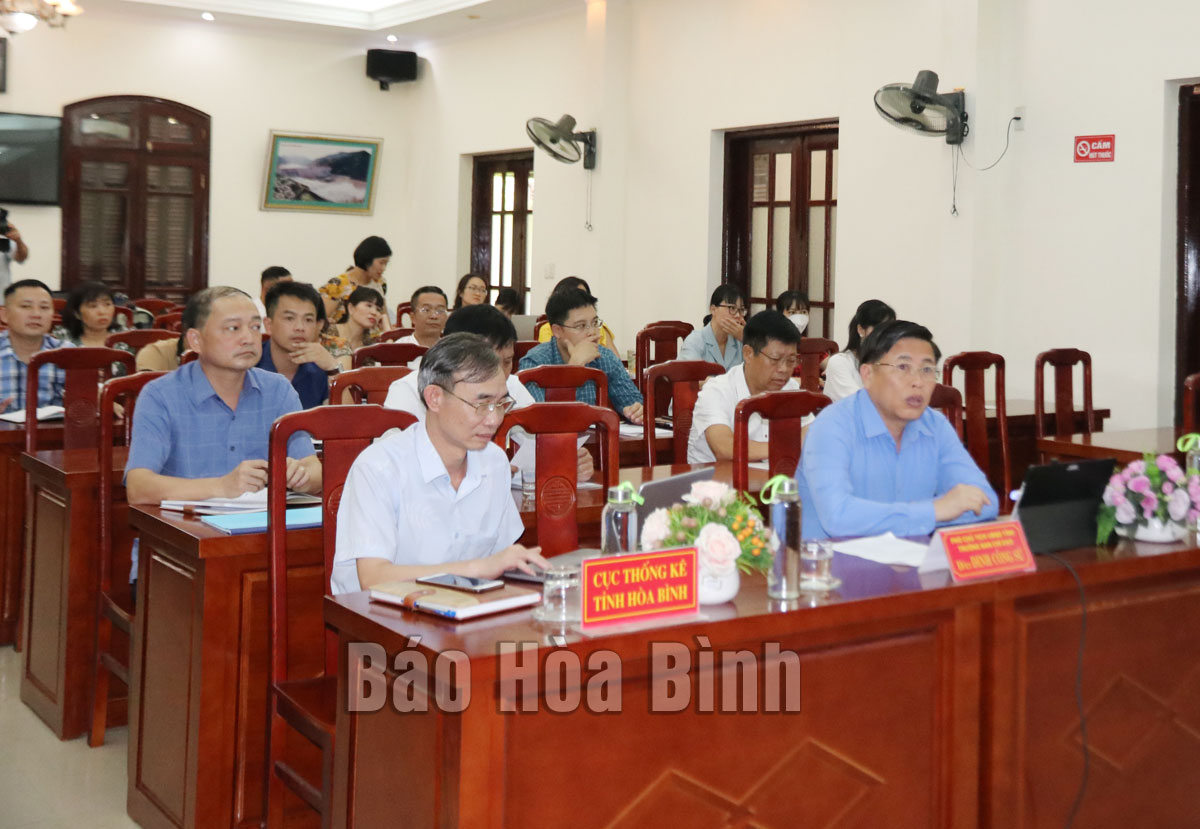
(HBO) – The steering committees of central economic census and central administrative facility survey on June 29 held a nationwide conference to announce the official findings for 2021. Truong Hai Long, Deputy Minister of Home Affairs chaired the event. Attending from Hoa Binh was a delegation headed by Dinh Cong Su, Vice Chairman of the provincial People’s Committee and head of the steering committee for the provincial 2021 economic census.

Dinh Cong Su, Vice Chairman of the provincial
People’s Committee, and other local delegates remotely attend the conference.
The 2021 economic census has a large scale surveying
enterprises; individual production units; non-business units and associations;
and religious establishments. With 2020 chosen as the year of data, between
March and December 2021, the economic census was deployed from central to local
levels through the economic census steering committees at all levels, and under
the Ministry of Defense and the Ministry of Public Security. To date, the
processing and summarising of official results have been completed on schedule.
As a result, the total number of surveyed units in the
economic census exceeded 6 million, an increase of 7.5% compared to 2016. The
number of employees in these units was 27.5 million, up 4.3% from 2016.
Speaking at the function, Truong Hai Long, Deputy Minister
of Home Affairs, highlighted the importance of the census in reviewing the
economic situation and proposing solutions for the socio-economic development
of the nation and each locality.
He said a number of outstanding achievements were recorded.
Many businesses were sustained and grew despite the pandemic; while the economic
structure continued to shift positively and in the right direction. The capital
structure among different types of enterprises also changed in a positive
direction, with non-state and FDI enterprises obtaining increasing proportions.
The proportion of heads of units with university or post-graduate degrees went
up significantly, reflecting the qualitative improvement of the core
workforce./.
The Standing Board of the Hoa Binh provincial Party Committee has agreed in principle on a proposal by the Standing Board of the Party Committee of Hoa Binh city to gather feedback on the city’s 1:2000 zoning plan, which forms part of its broader urban development strategy.
Hoa Binh province has made notable progress in public administration reform and digital government development, with the satisfaction index among citizens and businesses reaching over 84%, according to recent government evaluations.
Thanks to great efforts by local authorities in recent times, the governance and public administration performance of Mai Chau district has been significantly improved.
In the afternoon of June 6, the Party Committee, the People's Council, the People's Committee and the Fatherland Front of Lac Son district solemnly held a meeting to celebrate the 139th anniversary of the district's founding (1886–2025) and the 79th anniversary of the establishment of the district's Party Committee (1946–2025). There was the attendance of Mr. Bui Van Thang, the Vice Chairman of the Provincial People's Council; Mr. Quach Tat Liem, the Vice Chairman of the Provincial People's Committee; Ms. Dang Bich Ngoc, the Deputy Head of the National Assembly Delegation of the province; as well as the former leaders of the province and district through various periods, who are the natives of the district.
Implementing the Politburo’s Resolution No. 57-NQ/TW on breakthroughs in science – technology, innovation, and digital transformation is a golden opportunity for the northern mountainous province of Hoa Binh to renew growth model, improve competitive edge and shorten digital gap.
Resolution 57-NQ/TW, issued by the Politburo on December 22, 2024, identifies sci-tech, innovation, and digital transformation as strategic breakthroughs to build a developed and prosperous nation. In Hoa Binh province, this spirit is not just a slogan, it’s being put into action through concrete initiatives that form a "new development triangle”: digital citizenship, digital economy, and digital administration.



